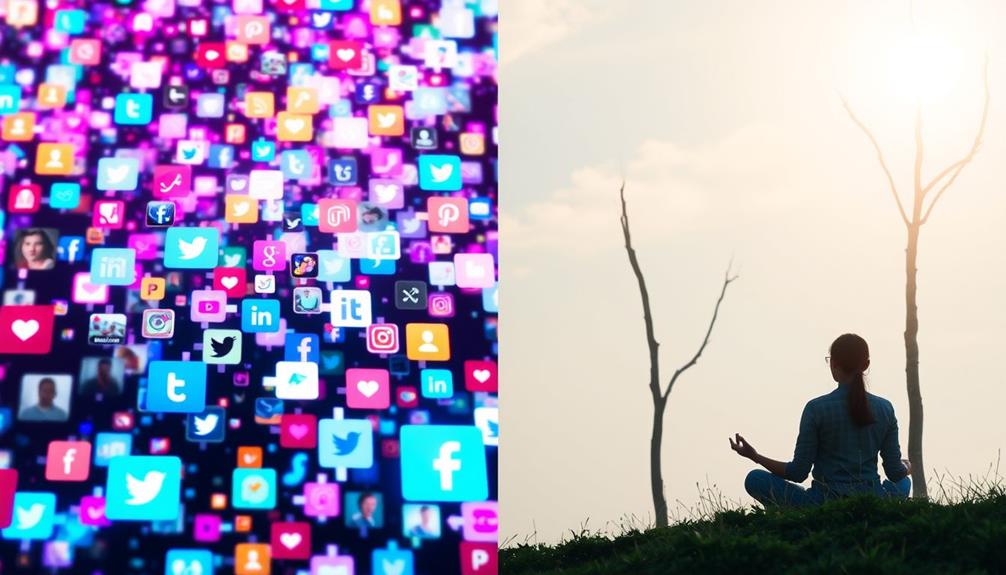Social media impacts your mental health in several ways. Spending more than three hours online can double your risk of anxiety and depression. You might find the constant comparison to curated images and the stress from likes and comments can hurt your self-esteem. Cyberbullying is rampant, affecting nearly 44% of U.S. users, leading to serious emotional distress. While social media can foster connections, it often results in feelings of isolation. Establishing boundaries and curating your feed can help. There's much more to explore about how social media shapes our mental well-being and how you can navigate it effectively.
Key Takeaways
- Excessive social media use, particularly over three hours daily, significantly increases the risk of anxiety and depression, especially among teens.
- Cyberbullying affects nearly 44% of internet users, severely impacting self-esteem and mental well-being, with 59% of teens reporting online harassment.
- The dopamine rush from likes can lead to negative self-worth, as individuals may feel inadequate without social validation.
- Comparison to curated and filtered images can trigger body image issues and self-consciousness, particularly among young females.
- Setting boundaries and engaging in uplifting content can mitigate negative mental health impacts associated with social media usage.
Mental Health Impacts
In recent years, social media has become a significant part of daily life, but its impact on mental health is alarming. You mightn't realize that excessive social media use is linked to increased anxiety and depression, especially among teens and young adults. Studies show that if you spend over three hours a day on these platforms, you're doubling your risk for mental health issues.
Additionally, just like the importance of early intervention in speech therapy can be vital for children, timely awareness and action regarding social media use can make a difference in mental health outcomes.
The addictive nature of social media can cause a dopamine rush, making you feel good when you receive likes and comments. But when the expected approval doesn't come, it can damage your self-worth, leading to feelings of inadequacy.
You may also find yourself comparing your life to filtered images and unrealistic beauty standards, which can create self-consciousness and body image problems. This is particularly true for young females, who face higher rates of disordered eating behaviors.
Moreover, the Fear of Missing Out (FOMO) exacerbated by social media can leave you feeling lonely and dissatisfied with life. With nearly 44% of U.S. internet users experiencing cyberbullying, the impact on self-esteem and mental well-being can be severe.
Recognizing these effects is essential for your mental health.
Safe Social Media Practices

Setting boundaries on your social media use is essential for maintaining mental well-being.
Engaging with uplifting content, such as mental health quotes that inspire resilience, and limiting your time online can create a healthier balance in your life.
Take a moment to evaluate your habits and make adjustments that support your mental health.
Set Boundaries Effectively
To maintain your mental well-being in the digital age, establishing effective boundaries around social media use is essential. Setting clear limits helps you manage your engagement with social media apps and reduces feelings of digital burnout.
Additionally, the emotional impact of social media can mirror the effects seen in other life stressors, such as the emotional effects of divorce. Here are three key strategies to set boundaries effectively:
- Time Limits: Aim to limit your social media use to 30 minutes a day. Studies show that this can greatly decrease anxiety and depression levels, promoting better mental health.
- Designated Hours: Create specific times during the day for social media use. This practice encourages healthier habits and fosters more in-person interactions, which are essential for your emotional well-being.
- Curate Your Feed: Unfollow or mute accounts that trigger negative feelings or comparisons. Reducing exposure to harmful content can enhance your mental health by allowing you to focus on more uplifting interactions.
Regularly evaluating your social media habits is critical. By implementing these strategies, you can foster a more balanced approach to technology usage, ultimately promoting better mental wellness in your life.
Engage With Positive Content
After establishing boundaries around your social media use, focusing on the type of content you engage with can further improve your mental well-being. Make it a priority to engage with positive content that uplifts and inspires you. Following accounts that share motivational quotes, success stories, or heartwarming experiences can foster feelings of happiness and belonging, directly benefiting your mental health.
Additionally, just as cats exhibit signs of attachment to their owners, engaging with supportive online communities can strengthen your emotional connections and provide a sense of belonging.
Curating a feed filled with inspirational content helps you avoid negative comparisons that often lead to feelings of inadequacy. By limiting interactions with accounts that trigger anxiety or sadness, you can greatly reduce symptoms of depression linked to social media use. Instead, surround yourself with voices that offer emotional support and encouragement.
Regularly evaluate your social media habits to make sure they align with your well-being goals. Engaging with positive content not only combats loneliness but also builds emotional resilience, leading to improved overall mental health stability.
Finding Happiness Beyond Screens

While scrolling through social media can offer a temporary escape, finding true happiness often lies in disconnecting and engaging with the world around you.
The benefits of prioritizing real-life experiences are immense for your mental health, including improved emotional well-being and enhanced social interactions, much like the positive effects of hydration tips essential for high-altitude trekking.
Here's how you can start finding happiness beyond screens:
- Engage in Outdoor Activities: Whether it's hiking, biking, or playing sports, immersing yourself in nature can greatly boost your mood and help build social connections with others.
- Explore Creative Hobbies: Activities like painting, writing, or crafting not only provide a sense of achievement but also serve as a fulfilling escape from screen time.
- Evaluate Your Social Media Habits: Regularly reviewing how your online interactions affect your emotions can help you identify triggers that lead to anxiety or dissatisfaction.
Recognizing Anxiety Symptoms

You might notice common anxiety indicators like excessive worry or restlessness creeping into your daily life.
During challenging times, it's vital to prioritize self-care, which may include practices like seeking information on safe orgasms in second trimester or engaging in relaxing activities.
Pay attention to physical symptoms, such as headaches or sleep issues, as these can signal a deeper connection to your mental state.
Recognizing when these feelings become overwhelming is important for knowing when to seek help.
Common Anxiety Indicators
Frequently, anxiety can manifest in various ways that are important to recognize for timely intervention. As a social media user, you might notice certain anxiety symptoms affecting your mental health. Identifying these indicators can help you take the necessary steps towards managing your feelings.
It's important to foster social connections to combat feelings of isolation, as these interactions can help mitigate anxiety social connections.
Here are three common anxiety indicators to watch for:
- Excessive Worry: You may find yourself constantly worrying about daily tasks or future events, which can interfere with your ability to enjoy life.
- Restlessness: Feeling on edge or unable to relax is a significant sign of rising anxiety levels. You might notice it becoming harder to focus or sit still.
- Social Withdrawal: If you start avoiding social interactions, it may indicate that your anxiety is escalating. This withdrawal can further isolate you, worsening your mental health.
Recognizing these symptoms is important. Persistent feelings of sadness or hopelessness should prompt you to seek professional evaluation.
Early intervention is essential, as addressing these anxiety symptoms promptly can lead to improved long-term outcomes.
Physical Symptoms Awareness
Recognizing physical symptoms of anxiety is essential for effective management and self-care. When you experience headaches, stomach issues, or sleep disturbances, it's vital to pay attention. These symptoms often arise from excessive stress or worry, which can be exacerbated by social media addiction. You might also notice increased heart rate, muscle tension, or fatigue, signaling heightened anxiety levels.
Individuals with narcissistic traits may amplify their anxiety through social media as they seek constant validation and admiration, leading to further emotional distress. This impact on relationships can create a cycle of anxiety that affects overall well-being.
If you find yourself withdrawing from social interactions or avoiding activities you once enjoyed, these behaviors may indicate your anxiety is escalating. Ignoring these physical symptoms can lead to further complications, impacting your daily life and overall well-being.
It's important to understand that persistent feelings of sadness or hopelessness, coupled with these physical manifestations, require your attention. Early intervention can make a significant difference in managing anxiety symptoms, both physical and emotional. By acknowledging these signs, you empower yourself to take charge of your mental health.
Stay aware of how your body responds to stress, especially in our socially connected world that may heighten your anxiety levels. By recognizing these symptoms early, you can implement strategies for better self-care and improved mental health outcomes.
When to Seek Help
Many people underestimate the importance of seeking help when anxiety symptoms become overwhelming. Recognizing when you need support is vital for maintaining your mental health. If you notice any of these signs, it's time to reach out:
- Excessive worry: Constantly feeling anxious about daily tasks can signal that you need professional help. This is similar to how stress management techniques can benefit overall wellness and help alleviate anxiety symptoms.
- Social withdrawal: Avoiding social interaction or isolating yourself can indicate that your anxiety is escalating.
- Persistent sadness: If feelings of hopelessness linger, don't hesitate to contact a mental health provider.
Ignoring these symptoms can lead to significant interference in your work, relationships, and overall quality of life. Anxiety can manifest physically, causing headaches or stomach issues, which only adds to your stress.
Early intervention is key; studies suggest that addressing anxiety symptoms promptly can lead to better long-term outcomes. By seeking help, you're not just managing your anxiety, but also prioritizing your mental health.
Understanding Cyberbullying

Cyberbullying has become a pervasive issue in today's digital landscape, affecting nearly half of all teens online. Defined as repeated harassment through electronic devices, cyberbullying impacts about 44% of U.S. internet users. This alarming statistic highlights how widespread this problem is, with a Pew Research Center survey revealing that 59% of U.S. teens have faced bullying or harassment online.
As digital creativity and technology play a significant role in children's lives, ensuring they've the skills to navigate these challenges is essential for their emotional well-being resources for teaching digital responsibility and ethics.
The consequences of cyberbullying extend beyond immediate hurt feelings. Victims often endure severe emotional distress, leading to long-term mental health issues like increased depression, anxiety, and social isolation.
You might notice changes in behavior in someone being bullied—such as withdrawal from social interactions, which are important signs that require timely support.
Open communication about online experiences is essential for prevention and intervention. By encouraging discussions about cyberbullying, you can help mitigate its risks and foster a safer online environment.
If you or someone you know is experiencing cyberbullying, it's imperative to seek help and support. Understanding both the signs and the impact of cyberbullying can empower you to take action and create positive change in your digital community.
Benefits and Harms of Social Media

While social media offers a platform for connection and expression, it also brings significant challenges that can impact mental health. You might find that social media has both benefits and harms:
- Positive Connections: About 58% of teens feel more accepted through online interactions, fostering supportive relationships.
- Negative Impacts: Over 80% of teens experience issues like cyberbullying and social comparison, which can lead to anxiety and depression.
- Excessive Use: Spending more than three hours a day on social media doubles the risk of mental health issues, particularly for girls and those with pre-existing conditions.
Despite the potential for positive experiences, heavy social media usage often leads to increased feelings of loneliness and isolation.
The algorithms that govern what you see can promote harmful content, distorting body image and triggering disordered eating behaviors.
It's essential to recognize that while social media can enhance your connections, excessive use can create barriers to real-life interactions and negatively affect your mental health.
Balancing your online presence with offline relationships may help mitigate these risks.
Resources for Mental Health Support

As the challenges of social media continue to affect mental health, having access to reliable resources can make a significant difference. Organizations like McLean Hospital provide free mental health resources, including online screening tools and educational webinars, which help you understand and navigate mental health issues. These tools empower you to take charge of your mental well-being.
HelpGuide.org is another valuable resource, offering a variety of materials that emphasize the important role of community support. Engaging with your community can enhance your coping strategies and create a sense of belonging, which is essential in today's digital age.
If you're seeking personalized assistance, professional therapy options are necessary in managing mental health concerns, especially those worsened by social media use. Encouraging open discussions about mental health within your community can also help reduce stigma and promote timely intervention for those in need.
For parents, accessing resources specifically aimed at child and teen mental health is critical in supporting their children's emotional well-being in the context of social media. By utilizing these resources, you can foster a healthier relationship with social media and prioritize your mental health.
Conclusion
In today's digital world, it's essential to recognize how social media can shape our mental health. Did you know that over 60% of teens report feeling anxious due to social media pressures? By practicing safe online habits and seeking joy beyond screens, you can mitigate these effects. Remember, it's okay to unplug and focus on real-life connections. If you or someone you know is struggling, don't hesitate to reach out for support. Your mental well-being matters!










